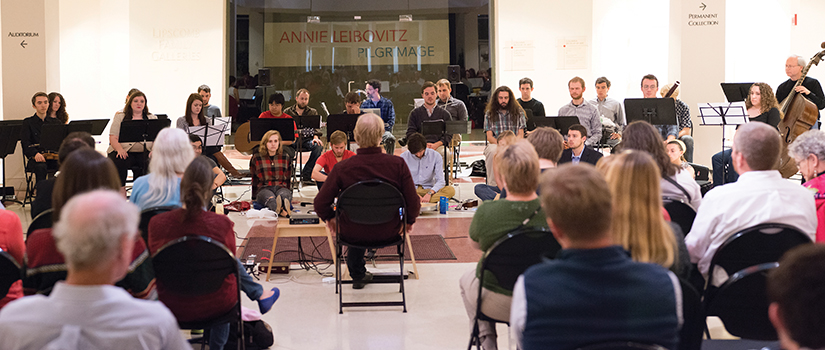Experimental Music Workshop takes Pisaro’s music on the road
When students take Greg Stuart’s Experimental Music Workshop class, surprising things happen. Like when The New York Times praised the group’s performance at the Columbia Museum of Art as “patient, unpredictable, [and] exceedingly beautiful.” Or that one of today’s premier experimental music labels, Edition Wandelweiser Records, is releasing the class’ debut recording this fall. But most surprising is that the majority of students in the group are not music majors.
The Experimental Music Workshop ensemble has been invited to perform the music of Michael Pisaro with the International Contemporary Ensemble in New York City at Abrons Arts Center on September 16, 2016 – the concert was mentioned by Alex Ross in The New Yorker. The ensemble also tours to Gettysburg College (PA), University of Delaware, Baltimore’s Evolution Contemporary Music Series, and University of NC-Wilmington. They will perform in Columbia, SC, on September 20, 6:00 p.m. at 701 Center for Contemporary Art (701 Whaley St.). The concert is free.
Offered through the South Carolina Honors College, the class is open to students of all musical abilities and backgrounds, a collaborative and egalitarian dynamic that lies at the heart of the experimental music tradition. Stuart, a percussionist whose work draws upon a mixture of music from this tradition, is a proponent of collaboration and has worked extensively with renowned composer Michael Pisaro.
Students in the course are treated as equal collaborators and each semester perform in concerts with Stuart and renowned guest artists. To date they have worked with violinist Erik Carlson, percussionists Tatsuya Nakatani, Tim Feeney and Sarah Hennies, and composers Nomi Epstein, Michael Pisaro and Jürg Frey, on world premiere performances that have achieved national attention.
The course asks students to rethink the very way they listen and what music is. The compositions Stuart uses in class challenge students’ preconceived notions of form, duration and notation. Rather than strictly determining various musical parameters, experimental works suggest, with varying levels of concreteness, how a performer might work with things like pitch, rhythm or timbre. Students use a combination of conventional and unconventional instruments in realizing these kinds of pieces. This sense of openness allows for unforeseen combinations of sounds to come together, producing moments of singular intensity and beauty.
Stuart believes that working with experimental music has effects beyond the class itself. For example, listening is a central component of the course. His students report developing a heightened awareness of sound and duration through the daily classroom performance activities. Students also begin to hear their everyday sonic environments in new ways, says Stuart. These experiences with experimental music in the classroom change how students hear the world and how they locate themselves in it through sound.
